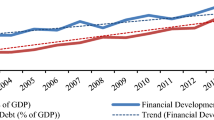Abstract
This paper investigates the leverage choices of an entrenched controlling party. If debt effectively curbs the private benefits of control, the controlling shareholder is given incentives to avoid debt. Using estimates of the private benefits of control and financial statement data from selected Korean firms, we find that a controlling party with large private benefits tends to lower debt. This relationship was concentrated after the Asian financial crisis. However, before the crisis, firms that affiliated with Korean conglomerates, chaebols, used more debt as private benefits increased. A financial reform program triggered by the crisis seems to have actuated the disciplining role of debt.
Similar content being viewed by others
References
Bae, Kee-Hong, Kang, Jun-Koo, Kim, Jin-Mo (2002) Tunneling or value added? Evidence from mergers by Korean business groups. Journal of Finance 57:2695–2740
Baek, Jae-Seung, Kang, Jun-Koo, Park, Kyung-Suh (2004) Corporate governance and firm value: evidence from the Korean financial crisis. Journal of Financial Economics 71:265–313
Baker, Malcolm, Wurgler, Jeffrey (2002) Market timing and capital structure. Journal of Finance 57:1–32
Barclay, Michael J, Holderness, Clifford G (1989) Private benefits from control of public corporations. Journal of Financial Economics 25:371–395
Berger, Philip G, Ofek, Eli, Yermack, David L (1997) Managerial entrenchment and capital structure decisions. Journal of Finance 52:1411–1438
Bebchuck, Lucian A, Kraakman, Reinier, Triantis, George (2000) Stock pyramids, cross-ownership, and dual class equity: the mechanisms and agency costs of separating control from cash-flow right. In Concentrated Corporate Ownership (eds., Randall K Morck). Chicago:University of Chicago Press
Borensztein, Eduardo, Lee, Jong-Wha (2002) Financial crisis and credit crunch in Korea: evidence from firm-level data. Journal of Monetary Economics 49:853–875
Chung, Kee H, Kim, Jeong-Kuk (1999) Corporate ownership and the value of a vote in an emerging market. Journal of Corporate Finance 5:35–54
Claessens, Stijn, Djankov, Simeon, Fan, Joseph PH, Lang, Larry HP (2002) Disentangling the incentives and entrenchment effects of large shareholdings. Journal of Finance 57:2741–2771
DeAngelo, Harry, DeAngelo, Linda (1985) Managerial ownership of voting rights. Journal of Financial Economics 14:33–69
DeAngelo, Harry, Masulis, Ronald W (1980) Optimal capital structure under corporate and personal taxation. Journal of Financial Economics 8:3–29
Doidge, Craig (2004) U.S. cross-listings and the private benefits of control: evidence from dual-class firms. Journal of Financial Economics 72:519–553
Dyck, Alexander, Zingales, Luigi (2004) Private benefits of control: An international comparison. Journal of Finance 59:537–600
Grossman, Sanford J, Hart, Oliver D (1982) Corporate financial structure and managerial incentives. In The Economics of Information and Uncertainty (eds., John J. McCall). Chicago: University of Chicago Press
Faccio, Mara, Lang, Larry HP, Young, Leslie (2004) Debt and expropriation. Working paper, Vanderbilt University
Harvey, Campbell R, Lins, Karl V, Roper, Andrew H (2004) The effect of capital structure when expected agency costs are extreme. Journal of Financial Economics 74:3–30
Harris, Milton, Raviv, Artur (1990) Capital structure and the informational role of debt. Journal of Finance 45:321–350
Jensen, Michael C (1986) Agency cost of free cash flow, corporate finance, and takeovers. American Economic Review 76:323–329
Jensen, Michael C, Meckling, William H (1976) Theory of the firm: managerial behavior, agency costs, and capital structure. Journal of Financial Economics 3:305–360
Joh, Sung-Wook (2003) Corporate governance and firm profitability: evidence from Korea before the economic crisis. Journal of Financial Economics 68:287–322
Johnson, Simon, Boone, Peter, Breach, Alasdair, Friedman, Eric (2000) Corporate governance in the Asian financial crisis. Journal of Financial Economics 58:141–186
La Porta, Rafael, Lopez-de-Silanes, Florencio, Shleifer, Andrei, Vishny, Robert (2002) Investor protection and corporate valuation. Journal of Finance 57:1147–1170
Lemmon, Michael L, Lins, Karl V (2003) Ownership structure, corporate governance, and firm value: evidence from the East Asian financial crisis. Journal of Finance 58:1445–1468
Lehn, Kenneth, Poulsen, Annette (1989) Free cash flow and shareholder gains in going private transactions Journal of Finance 44:771–787
Maloney, Michael T, McCormick, Robert E, Mitchell, Mark L (1993) Managerial decision making an capital structure. Journal of Business 66:189–217
Mehran, Hamid (1992) Executive incentive plans, corporate control, and capital structure. Journal of Financial and Quantitative Analysis 27:539–560
Milnor, John W, Shapley, Lloyd S (1978) Values of large games II: oceanic games. Mathematics of Operations Research 3:290–307
Mitton, Todd (2002) A cross-firm analysis of the impact of corporate governance on the East Asian financial crisis. Journal of Financial Economics 64:215–241
Myers, Stewart C (1977) Determinants of corporate borrowing. Journal of Financial Economics 5:147–175
Myers, Stewart C, Majluf, Nicholas S (1984) Corporate financing and investment decisions when firms have information that investors do not have. Journal of Financial Economics 13:187–221
Nenova, Tatiana (2003) The value of corporate voting rights and control: A cross-country analysis. Journal of Financial Economics 68:325–351
Rydqvist, Kristian (1996) Takeover bids and the relative prices of shares that differ in their voting rights. Journal of Banking and Finance 20:1407–1425
Rydqvist, Kristian (1987) Empirical investigation of the voting premium. Working paper, Northwestern University
Stulz, Rene M (1990) Managerial discretion and optimal financing policies. Journal of Financial Economics 26:3–28
Titman, Sheridan, Wessels, Robert (1988) The determinants of capital structure choice. Journal of Finance 43:1–19
Zingales, Luigi (1995) What determines the value of corporate votes? Quarterly Journal of Economics 110:1047–1073
Author information
Authors and Affiliations
Corresponding author
Additional information
JEL Classification G32, G34
Rights and permissions
About this article
Cite this article
Kang, J., Kim, JS. Private benefits of control and firm leverage: An analysis of Korean firms. Rev Quant Finan Acc 27, 439–463 (2006). https://doi.org/10.1007/s11156-006-0046-z
Issue Date:
DOI: https://doi.org/10.1007/s11156-006-0046-z




